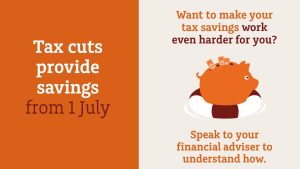When you compare your current lifestyle, expenses and savings with what you’re planning for in retirement, does it all add up? Find out why it’s important to balance your cash flow now with the super savings you’re going to need in retirement.
Money & Life contributors draw on their diverse range of experience to present you with insights and guidance that will help you manage your financial wellbeing, achieve your lifestyle goals and plan for your financial future
Living from pay cheque to pay cheque is something that many Australians are used to doing. In fact, based on levels of personal debt, quite a number of us are in the habit of spending more than we earn so we can enjoy life to the full. According to the latest Finder statistics on credit card debt, the average balance owing is $3,384, with $1,937 accruing interest.
While this might not seem like a significant amount to pay off when you’re young and have a job, it’s a reminder that the habit of spending beyond our means can be a hard one to break. “In choosing your current lifestyle and the debts you’re taking on to maintain it, you may get to feel very comfortable on this part of your journey,” says CERTIFIED FINANCIAL PLANNER® professional Tony Sandercock of wetalkmoney. “But If you don’t scale things back a little now and save instead of borrowing, you could face a big drop in your income and living standards when you reach retirement.”
Dealing with debt in retirement
These words of caution from Tony might seem more relevant to a millennial generation who can find It hard to curb their spending thanks to their widely reported FOMO (Fear of Missing Out) and YOLO (You Only Live Once) lifestyles. But according to a report from REST super, retiring with money owing isn’t unusual. 46% of workers aged 50+ expect to retire with some debt and not just from their mortgage. In fact, credit cards actually make up the largest percentage of their debt (25%) followed by home loans (21%) and unpaid bills (19%).
While personal debt can become a problem when you’re working, paying back credit card balances, loans and a mortgage out of super savings could really limit your spending in retirement. “At any time in your life, borrowing money means knowing how you’re going to service that debt in future,” says Nathan Nash CFP®. “In retirement, your income is coming from savings, not salary. The repayments are only going to increase your day-to-day budget in the future, leaving you with less money for treating yourself. And if spending more now means running out of money in a decade, you could find yourself living on just the Age Pension which may not be enough to meet your needs. Being unable to afford to live longer is not a position anyone would want to find themselves in.”
Will you spend more or less in retirement?
To help you get an idea of the difference it will make to minimise debts and maximise savings, it’s worth considering just how much you’ll need to retire. When it comes to calculating the average amount you can expect to spend in retirement, there are some general estimates available. The Association of Superannuation Funds of Australia (ASFA) update their Retirement Standard estimates every year for what couples and singles are spending on a modest or comfortable lifestyle in retirement.
But your definition of a comfortable lifestyle could be quite different to the average. In the December 2019 Retirement Standard budgets published by the ASFA, overseas travel for a couple living comfortably lifestyle is expected to cost approximately $1,500 every year, while money spent on dining out is far more generous at around $4,300 per year. Your plans for retirement will depend on many things, including where you live and how you like to spend your time. So it can be quite a challenge to draw up your very own forecast for the cost of living in retirement. This is where a financial planner can help you pin down your numbers for different budget items and model future scenarios based on your expected costs, super savings and other sources of retirement income.
Small steps towards a big goal
If your super savings are not on track to achieve your idea of comfortable retirement, it’s time to stop procrastinatingand understand the barriers that are holding you back. No matter how far off retirement may seem, it’s the little things you do now that will build up your savings over time.
Heeding Tony’s advice to scale things back means taking a good look at your cash flow now to see where savings can be made on what you’re spending. Drawing up a budget might sound difficult but can be much easier than you think with all the apps and tools available online.
Once you have a good sense of where your money is going, look at how can you reduce unnecessary spending. Where can you save money? How can you cut down on, or consolidate, any debt you may have?
This article has been been reproduced from here.
Disclaimer: The views expressed in this publication are solely those of the author; they are not reflective or indicative of Financial Services Partners position and are not to be attributed to Financial Services Partners. They cannot be reproduced in any form without the express written consent of the author. The information provided in this document, including any tax information, is general information only and does not constitute personal advice. It has been prepared without taking into account any of your individual objectives, financial situation or needs. Before acting on this information you should consider its appropriateness,
having regard to your own objectives, financial situation and needs. You should read the relevant Product Disclosure Statements and seek personal advice from a qualified financial adviser. From time to time we may send you informative updates and details of the range of services we can provide. If you no longer want to receive this information please contact our office to opt out. Financial Services Partners Pty Ltd ABN 15 089 512 587, AFSL 237590








